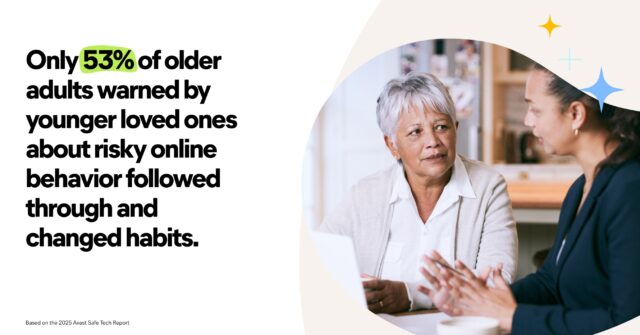Nearly 60% of older adults have fallen for cyber scams, report finds

Online scams are evolving quickly, and while younger people often adapt with ease, older adults may not be keeping up.
According to Avast, nearly 60 percent of older loved ones have already fallen victim to cybercrime. Even when younger family members raise the alarm, the message does not always get through. Although 84 percent of adults say they have spoken to older relatives about potentially risky online habits, only 53 percent of those warned have taken the advice seriously and made changes
Avast reports that more than 80 percent of cybercrime stems from scams and social engineering. These attacks rely less on hacking and more on tricking people into handing over money or personal information.
Older adults, who may not be as familiar with common digital warning signs, are especially vulnerable. The issue is not just about awareness, but also about action.
Some older adults dismiss the warnings, while others get confused. Many simply continue with old habits regardless, and nearly half still write down passwords on paper.
The challenge for many people often lies in the role reversal. Talking to parents or grandparents about digital safety can feel awkward, especially when those same people once taught you how to cross the street or cook a meal.

Avast says today’s threats require a different kind of guidance, and that younger, more tech-savvy generations may be in the best position to offer it.
“Technology moves fast and we often focus on its impact on younger generations, but we can't ignore how it affects our parents and grandparents, too,” said Leyla Bilge, Global Head of Scam Research at Avast. She likens the approach to an airplane safety briefing -- secure yourself first, then help others. Knowing what to look for online can help you guide someone else through it, even with just one conversation.
Jorij Abraham, Managing Director of the Global Anti-Scam Alliance, agrees that those conversations are crucial. “We need to make sure our parents and grandparents feel supported, not ashamed, when it comes to digital security,” he said. A scam victim is often caught off guard, not careless, and frank and honest discussions can help break down the stigma.
To make these conversations easier, Avast suggests learning a few key cyber safety tips yourself, then sharing them.
Talking about scam texts, fake emails, or odd phone calls can spark helpful conversations. Offer to help set up tools that protect devices, manage passwords, or filter out known scam websites.
For those still writing passwords on sticky notes, it might be time for a change. Experts recommend using long, unique passwords for each account -- ideally at least 15 characters with a mix of letters, numbers, and symbols. Password managers can help keep things organized without relying on memory or paper.
Spotting scams
Recognizing the signs of a scam is also important. Messages that create a false sense of urgency or claim to be from banks, government agencies, or tech support should raise suspicions.
Scams often try to force quick decisions -- pausing to think or double-check can stop a bad outcome before it happens.
Older adults are frequently targeted by romance scams, fake tech support pop-ups, phony invoices, and fake software updates.
Even something that looks like a Medicare message can be a scam. That is why regular conversations and check-ins matter. Knowing what to watch out for is the first step, and knowing who to talk to when something feels off is the second.
Avast encourages families to treat online safety like any other daily habit, similar to locking doors or checking smoke alarms. Creating a "phone-a-friend" plan where older adults can ask someone they trust before clicking a link or sharing information can also make a difference.
The 2025 Avast Safe Tech Report is available now and offers a number of resources to help support these conversations.
Have you had to have this conversation with older family members? How did it go? Let us know in the comments.
Image Credit: PathDoc/Shutterstock
